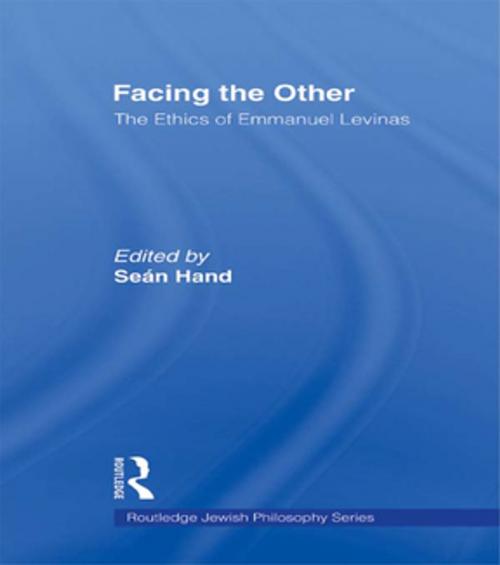Facing the Other
The Ethics of Emmanuel Levinas
Nonfiction, Social & Cultural Studies, Social Science, Cultural Studies, Ethnic Studies| Author: | Sean Hand | ISBN: | 9781317832485 |
| Publisher: | Taylor and Francis | Publication: | April 4, 2014 |
| Imprint: | Routledge | Language: | English |
| Author: | Sean Hand |
| ISBN: | 9781317832485 |
| Publisher: | Taylor and Francis |
| Publication: | April 4, 2014 |
| Imprint: | Routledge |
| Language: | English |
Emmanuel Levinas is one of the key philosophers in the post-Heideggerian field and an increasingly central presence in contemporary debates about identity and responsibility. His work spans and encapsulates the major philosophical and ethical concerns of the twentieth century, combining the insights of a basic phenomenological training with the demands of a Jewish culture and its basis in the endless exegesis of Talmudic reading. His concerns and subjects are wide: they include the Other, the body, infinity, women, Jewish-Christian relations, Zionism and the impulses and limits of philosophical language itself.
This collection explicates Levinas's major contribution to these debates, namely the idea of the primacy of ethics over ontology or epistemology. It investigates how, in the wake of a post-structuralist orthodoxy, scholars and practitioners in such fields as literary theory, cultural studies, feminism and psychoanalysis are turning to Levinas's work to articulate a rediscovered concern with the ethical dimension of their discipline. Stressing the largely assumed but unexplored Jewish dimension of Levinas's work, this book is an important contribution to the field of Jewish studies and philosophy.
Emmanuel Levinas is one of the key philosophers in the post-Heideggerian field and an increasingly central presence in contemporary debates about identity and responsibility. His work spans and encapsulates the major philosophical and ethical concerns of the twentieth century, combining the insights of a basic phenomenological training with the demands of a Jewish culture and its basis in the endless exegesis of Talmudic reading. His concerns and subjects are wide: they include the Other, the body, infinity, women, Jewish-Christian relations, Zionism and the impulses and limits of philosophical language itself.
This collection explicates Levinas's major contribution to these debates, namely the idea of the primacy of ethics over ontology or epistemology. It investigates how, in the wake of a post-structuralist orthodoxy, scholars and practitioners in such fields as literary theory, cultural studies, feminism and psychoanalysis are turning to Levinas's work to articulate a rediscovered concern with the ethical dimension of their discipline. Stressing the largely assumed but unexplored Jewish dimension of Levinas's work, this book is an important contribution to the field of Jewish studies and philosophy.















